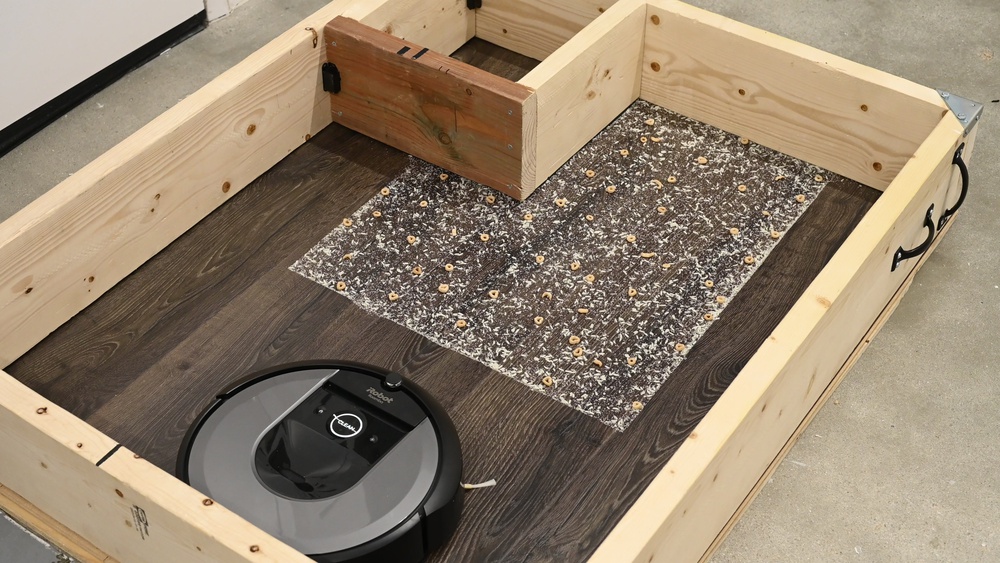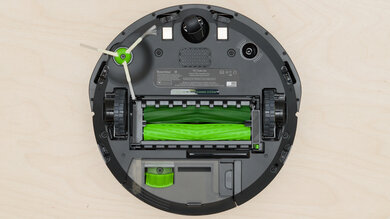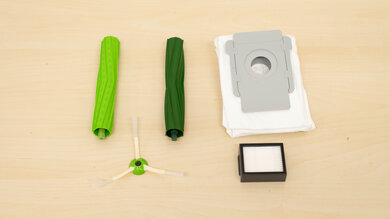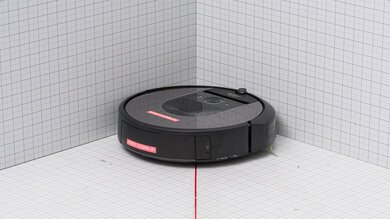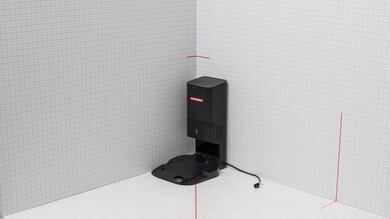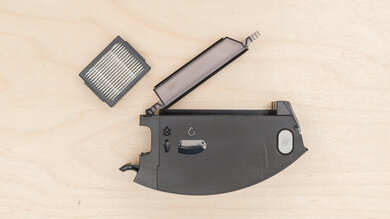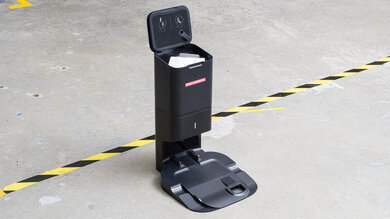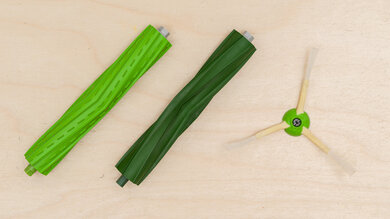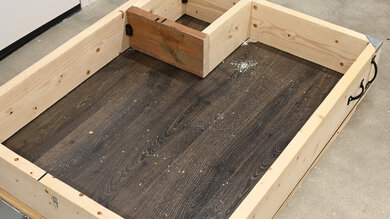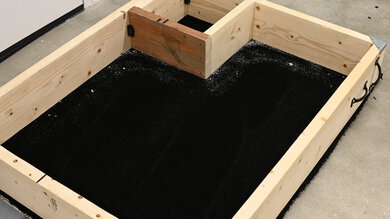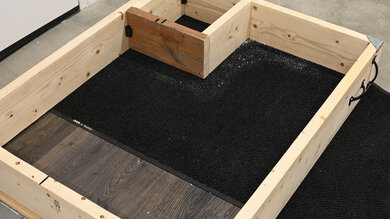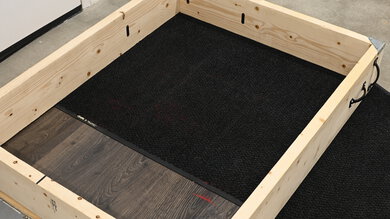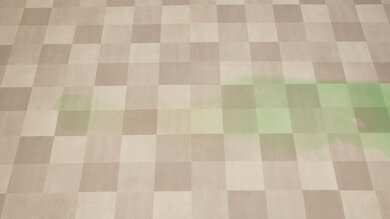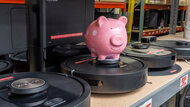The iRobot Roomba i8+ is a self-emptying robot vacuum and a Costco-exclusive variant of the iRobot Roomba i7. The vacuums are very similar in design and performance, though the i8+ comes with a virtual barrier device, an additional HEPA filter and dirtbag, and uses a higher-capacity battery that yields a longer overall runtime.
Our Verdict
-
Great maneuverability.
-
Self-emptying capability.
-
Great performance on bare floors.
-
Automatic height adjustment.
-
Easy to maintain.
-
Middling performance on low-pile carpet.
-
Struggles with fine debris on high-pile carpet.
-
Low real-world suction performance.
-
High recurring costs.
-
Can get stuck on rug tassels.
The iRobot Roomba i8+ is fairly effective for dealing with pet hair on floors. It excels when clearing away pet hair on bare floors and high-pile carpet but has a slightly harder time dealing with it on low-pile carpet. Its high-efficiency filter is effective in helping seal in allergens like pet dander, and its twin rubber brushrolls are easy to clean. Unfortunately, pet hair can get trapped at the entry point to its dirt compartment.
-
Great maneuverability.
-
Self-emptying capability.
-
Good air filtration performance.
-
Great performance on bare floors.
-
Automatic height adjustment.
-
Easy to maintain.
-
Middling performance on low-pile carpet.
-
Struggles with fine debris on high-pile carpet.
-
No mopping capability.
-
Struggles with pet hair on low-pile carpet.
-
Pet hair gets stuck at entry point to dirt compartment.
-
Low real-world suction performance.
-
High recurring costs.
-
Can get stuck on rug tassels.
-
Great maneuverability.
-
Self-emptying capability.
-
Great performance on bare floors.
-
Automatic height adjustment.
-
Easy to maintain.
-
Middling performance on low-pile carpet.
-
Struggles with fine debris on high-pile carpet.
-
Low real-world suction performance.
-
High recurring costs.
-
Can get stuck on rug tassels.
-
Great maneuverability.
-
Self-emptying capability.
-
Great performance on bare floors.
-
Automatic height adjustment.
-
Easy to maintain.
-
Middling performance on low-pile carpet.
-
Struggles with fine debris on high-pile carpet.
-
Low real-world suction performance.
-
High recurring costs.
-
Can get stuck on rug tassels.
-
Great maneuverability.
-
Self-emptying capability.
-
Great performance on bare floors.
-
Automatic height adjustment.
-
Easy to maintain.
-
Middling performance on low-pile carpet.
-
Struggles with fine debris on high-pile carpet.
-
Low real-world suction performance.
-
High recurring costs.
-
Can get stuck on rug tassels.
-
Great maneuverability.
-
Self-emptying capability.
-
Great performance on bare floors.
-
Automatic height adjustment.
-
Easy to maintain.
-
Middling performance on low-pile carpet.
-
Struggles with fine debris on high-pile carpet.
-
Low real-world suction performance.
-
High recurring costs.
-
Can get stuck on rug tassels.
- 6.2 Multi-Surface Household
- 6.2 Pets
Performance Usages
- 6.5 Debris Pickup: Hard Floor
- 7.0 Debris Pickup: Carpet
- 7.5 Debris Pickup: Pet Hair
- 5.8 Obstacle Handling
Changelog
- Updated Jul 02, 2025: We've converted this review to Test Bench 1.0, which updates our performance testing to include new tests to evaluate Obstacle Adaptability, Obstacle Avoidance, Height Clearance, and Threshold Clearance. We've also introduced new performance usages. For more information, see our changelog.
-
Updated Nov 26, 2024:
We've updated the review to include text for our new performance tests.
- Updated Jul 09, 2024: Converted to Test Bench 0.8.
- Updated Jan 22, 2024: Updated the 'Differences Between Variants' section of the review to include Roomba Combo i8 and Roomba Combo i8+ models. We've also updated the 'Stains' and 'In The Box' portions of the review to include more information on these product variants.
- Updated Nov 07, 2023: Converted to Test Bench 0.7.
Check Price
Differences Between Sizes And Variants
There are a couple of variants of the iRobot Roomba i8, which differ somewhat in overall specification.
| Model Name | Base Station Included | Mopping Capability | Accent Color | Notes |
| Roomba i8+ | Yes | No | Black/Silver | |
| Roomba Combo i8 | No | Yes | Black/Gray | European Market Exclusive |
| Roomba Combo i8+ | Yes | Yes | Black/Gray | European Market Exclusive |
You can see the label for our test unit here.
Let us know in the comments if you encounter another variant of this vacuum, and we'll update our review.
Compared To Other Robot Vacuums
The iRobot Roomba i8+ differs little from the iRobot Roomba i7 but ultimately represents a slightly better deal overall thanks to the added bundled accessories, which include an additional dirtbag for its base station, an extra high-efficiency filter, and a virtual barrier device. Its maneuverability is excellent, though it lacks the hazard-avoidance function found on the newer iRobot Roomba j7.
If you're looking for an alternative, look at our list of recommendations of the best robot vacuums, the best robot vacuums for hardwood floors, and the best robot vacuums for carpet.
While both vacuums are almost identical, the iRobot Roomba i8+ ultimately represents a better deal than the iRobot Roomba i7. The i8+ comes with an additional dirtbag for its self-emptying station, an extra high-efficiency filter, and a virtual barrier device that you can use to set up no-go zones without opening the vacuum's companion app. The i8+ also uses a higher-capacity battery that yields a longer runtime; however, it does take a little longer to recharge.
The iRobot Roomba i8+ and the Roborock Q5 each have advantages. The iRobot feels better made, has easier-to-clean brushrolls, uses higher-capacity dirtbags for its base station, and comes bundled with two extra filters and two extra dirtbags. It also does a better job of sealing in fine allergens and charges a lot faster. However, the Roborock has a much longer overall battery life, delivers notably superior debris pickup performance on bare floors, and has a more comprehensive suite of automation functions in its app, like being able to control the vacuum manually using the 'Pin n Go' function. The Roborock's LIDAR sensor also allows for superior maneuverability in the dark.
The iRobot Roomba i8+ is better than the Shark AI Robot. The iRobot is better built, is easier to maintain, does a better job of handling pet hair, and has a significantly better companion app. It also comes with a self-emptying dock that reduces hands-on maintenance requirements and an automatic surface detection system. That said, the Shark has a longer maximum battery life.
The iRobot Roomba j7 has a more advanced set of automation features than the iRobot Roomba i8+. Not only does the j7 share the i8+'s self-emptying capability, but it can also identify and react to hazards like pet waste in real-time. It also feels better built. However, the i8+ delivers better overall debris-pickup performance across a range of surfaces.
The iRobot Roomba i8+ is better than the iRobot Roomba i3. The i8+ has a longer overall battery life, delivers superior performance on bare floors as well as carpets, and does a better job of maneuvering itself.
The iRobot Roomba i8+ and the Shark Matrix Plus are self-emptying robot vacuums exclusive to Costco retailers. Which one is right for you ultimately comes down to your priorities. The iRobot feels like the more premium product, with a much sturdier build, easier maintenance, and a slicker, easier-to-use companion app. It's also the better option if you suffer from allergies; not only does the iRobot do a better job of sealing in allergens as it cleans, but its base station uses a disposable dirtbag instead of the Shark's bagless system, so you won't have to worry about creating a plume of dust when emptying it. Meanwhile, the Shark has a LIDAR sensor that allows for quicker room mapping and slightly less sporadic navigation, even in the dark.
Test Results
The iRobot Roomba i8+ feels impressively well-built, with a body made mainly from high-grade plastic and dense rubber wheels. It feels very similar in construction to other iRobot models, but most like the iRobot Roomba i7.
After taking the vacuum out of its box, no assembly is required, and one dirtbag is already installed in its base station. However, you'll have to pair the vacuum with the station.
The iRobot i8+ has a couple of parts that need periodic cleaning, but they're easy to access.
- Dirtbag: You can simply access the disposable dirtbag inside the base station by opening its top lid and lifting it out. A seal cover falls in place once the bag is lifted out, preventing any dust from escaping. There's an indicator light that changes from white to red to let you know when to replace the bag or if there's a blockage.
- Dirt compartment: The vacuum's internal dustbin can be easily slid free from the back of the vacuum after pressing the release button. You can wash this part with water and wipe it with a dry cloth or tap it against your garbage bin to dislodge dirt. You should clean this part after every use.
- Brushrolls: You can easily access the brushrolls by removing the brush guard under the vacuum. Since there are no bristles to get in the way, it's pretty easy to remove any tangled hair by using your hands or scissors. It can be hard to get the brushroll to fit back into place once removed, though. You should clean this part once a month or twice a month if you have pets.
- Side brush: You need a screwdriver to remove the side brush. You should clean it by removing tangled hairs once a month or twice a month if you have pets.
- Filter: The filter is inside the vacuum's dirt compartment. You can tap it against your garbage bin to remove any debris stuck to it once a week, or twice a week if you have pets. Note that you can't wash this part.
- Wheel: You can pull the wheel out of its cavity and push it out of the socket to dislodge any hair or debris stuck to it. You should clean this part every two weeks.
- Sensors: You should clean the vacuum's sensors once a month with a dry cloth.
Any part that's washed in water should dry for 24 hours before use again.
Like the i7+ variant of the iRobot Roomba i7, this vacuum incurs somewhat high recurring costs.
- Dirtbag: You need to replace the disposable dirtbag when full. They're sold in packs of three from the manufacturer website.
- Brushrolls: You need to swap out the brushrolls every 12 months. You can buy a new set from the manufacturer here.
- Side brush: You can remove and replace the side brush every 12 months. They're sold in packs of three from the manufacturer website.
- HEPA filter: The HEPA filter needs replacing every two months. New filters are no longer available directly from the manufacturer's website, but resellers do still offer OEM replacements, as seen here. Compatible filters from third-party manufacturers are also available.
- Front caster wheel: You should remove and replace the wheel every twelve months. You can purchase this part from iRobot here.
iRobot sells a 'Replenishment Kit' that contains three side brushes, a new pair of multi-floor rubber brushrolls, and three HEPA filters.
The iRobot i8+ doesn't take up that much space. It's pretty small as far as robot vacuums go; its lack of a LIDAR sensor allows it to crawl under most low tables and couches. Meanwhile, its base station is taller but narrower than other self-emptying robot vacuums like the yeedi vac station, making it a little easier to fit in a nook between furniture. You can wrap up any excess length of power cord behind the vacuum.
The iRobot i8's internal dustbin is pretty small. This isn't a major issue if you purchase the i8+ or Combo i8+ variant, both of which come with a self-empty base station, but you'll have to dump debris manually if you buy the Combo i8 model instead, which isn't bundled with a self-empty station. Like many other iRobot models, this vacuum has a fill sensor and will alert you when the dustbin or dock station dirtbag is filled.
The i8+ and Combo i8+ models come with a self-empty base station that can accept a 2.4L dirtbag, which the manufacturer advertises as large enough to hold 30 full bins from the vacuum itself.
- iRobot Roomba i8+ robot vacuum
- Charging dock/bag emptying station (not included with Roomba Combo i8 variant)
- Charging cable
- 'Dual Mode Virtual Wall Barrier' device
- 3x HEPA filter
- 2x multi-surface rubber brushrolls
- 2x side brush (one already attached to the vacuum)
- Dirt compartments
- 4x dirtbags (not included with Roomba Combo i8 variant)
- User guide
The following attachments are exclusive to the Roomba Combo i8 and Roomba Combo i8+ models:
- Water tank
- 2x Microfiber mopping cloths
The following attachment is exclusive to the i8 Combo model:
- Charging dock
The iRobot Roomba i8+ has superb battery performance. iRobot's claim of its battery offering 20% additional capacity over the unit in the iRobot Roomba i7 bears out in the real world, as the latter can only run for about 75 minutes. However, this vacuum does take longer to recharge than the i7. You can keep an eye on the vacuum's current charge level by monitoring the indicator light around the 'Clean' touch-sensitive button, which switches from solid white to solid red as the charge level drops.
The iRobot i8+ has a few extra convenience features. Its surface detection system allows it to adjust the height of its cleaning head to match the floor type that it's on. It can also focus on cleaning areas with a higher concentration of debris. However, you can't adjust any of these parameters manually.
This vacuum does a decent job on high-pile carpet. It can clean most large and medium debris in a single pass; it's not as proficient with fine debris like sand, as it tends to get trapped in the carpet fibers. Corners and walls are also pain points, as the vacuum's side brushes can't pick up debris.
This vacuum has decent pick-up performance on low-pile carpets. It can clean most large and medium-sized debris like cereal or rice, but its side brushes tend to toss a small amount around. Fine debris is a pain point, as it leaves behind a fair amount in the carpet fibers, and the vacuum doesn't always effectively clean along walls or in corners.
This vacuum's pet hair pick-up performance is good. It can clean most pet hair in a single cycle, but it's unable to remove hair that's been worked deeply into the carpet fibers. While you'll want to run the vacuum again to remove all remaining hair, it has a built-in Dirt Detect feature that will perform extra cleaning when necessary. It doesn't work consistently, though.
This robot vacuum's airflow performance is poor, so it may struggle to pick up heavier debris.
The iRobot Roomba i8+ is very quiet. You won't have too much trouble hearing what people nearby are saying, even with the vacuum running nearby.
The iRobot Roomba i8+ does an excellent job of maneuvering itself. It uses the same iAdapt 3.0 system as the iRobot Roomba i7, which uses optical sensors to plot a course through its coverage area. It cleans in an organized, thorough pattern. The vacuum is small enough to clean under most tables, couches, and chairs and can climb onto thicker-pile carpeting without too much trouble. However, it can drag around lightweight rugs.
The iRobot Roomba i8+ does a great job of sealing in fine allergens thanks to its onboard high-efficiency filter.
The iRobot Roomba i8+ does a terrible job of dealing with stains. If you want mopping capability, you'll have to go for the Roomba Combo i8 or Roomba Combo i8+ variant; just note that these variants are only available in certain markets, and we haven't tested this mopping system's overall performance.
The iRobot Roomba i8+ has a wide array of automation features. You don't need an internet connection to use this vacuum, thanks to its physical controls. You can use the 'Dual Mode Virtual Wall Barrier' device to restrict the vacuum's movements to a specific area without having to use its companion app. It has two settings. 'Halo Mode' creates a circular no-go zone with a radius of about 12 inches from the center point of the barrier device. Meanwhile, 'Virtual Wall Mode' generates a straight barrier line, which is handy for blocking off doorways through which you don't want the vacuum to cross. Beyond that, there's also the vacuum's self-emptying capability, allowing it to transfer debris from its dustbin into an external dirtbag in its base station, reducing hands-on maintenance requirements. However, unlike the iRobot Roomba j7, it can't identify and avoid hazards like pet waste in real time.
The iRobot HOME app is great. It's very easy to use and features a broad range of animated infographics that demonstrate the vacuum's features as well as maintenance procedures. Once the vacuum's stored a map of your home, you can set dedicated cleaning times for specific rooms, direct it to clean a specific area, and create virtual barriers using the map. The app also displays battery life, and you can use it check previous cleaning jobs. A separate menu tab lets you see the replacement intervals for various parts, like its high-efficiency filter or side brush. You can also pair the vacuum with Alexa or Google Home devices, allowing you to use voice commands.
Comments
iRobot Roomba i8+: Main Discussion
Let us know why you want us to review the product here, or encourage others to vote for this product.
Update: We’ve converted this review to Test Bench 1.0, which updates our performance testing to include new tests to evaluate Obstacle Adaptability, Obstacle Avoidance, Height Clearance, and Threshold Clearance. We’ve also introduced new performance usages. For more information, see our changelog.
- 21010
Hello, there seems to be an error regarding the “stains”. The IROBOT ROOMBA COMBO I8 I8178 does have a mopping feature, as detailed on their website
Hi there, thanks for bringing this issue to our attention! While the i8 variant that we tested didn’t come with the mopping system, we’ll update the ‘Stains’ box to reflect that there is another model that does have it.
From what we can tell, it seems like the i8 Combo is a fairly new model that’s exclusive to the European market; we’ll update the ‘Differences Between Sizes And Variants’ to reflect this information too.
Thanks again for raising the flag on this, and don’t hesitate to reach out again if you have any further questions or concerns!
- 21010
Hello, there seems to be an error regarding the “stains”. The IROBOT ROOMBA COMBO I8 I8178 does have a mopping feature, as detailed on their website
Update: We’ve converted this review to Test Bench 1.2. This update builds on our previous ‘Suction’ test with a new ‘Airflow’ test that more accurately measures a vacuum’s ability to generate air movement. If you’d like to see an in-depth look at the reasoning and methodology behind this change, you can see our full changelog here..

